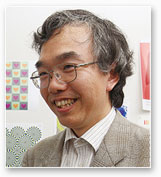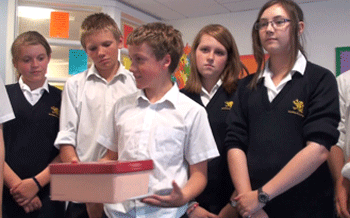RE Year 8
Can you believe your eyes?

Believe it or not, the grey boxes in Stripe A are the same shade of grey as the grey boxes in Stripe B. You can make this illusion yourself . (Here’s our version – so now you can check that the grey boxes really do match.)
Stripe Illusion

It’s amazing what you can do with PowerPoint. But for some REALLY clever illusions, you need an expert and we tracked down just the person. On the next page of this unit there are some incredible illusions produced by (no less than) a Professor of Optical Illusions … prepare to make your head spin.

After that we meet another scientist who became interested in an illusion. Galileo is famous for challenging the idea that the Sun moves around the Earth.
 Next it’s a quick investigation with a shoe box (Yes, a shoe box! We hunt far and wide for the best experiments you know).
Next it’s a quick investigation with a shoe box (Yes, a shoe box! We hunt far and wide for the best experiments you know).
 At the end of the unit, we meet a group of Year 8 students who wrote to the Archbishop of Canterbury, One of the questions they asked is why natural disasters happen – if God loves the world.
At the end of the unit, we meet a group of Year 8 students who wrote to the Archbishop of Canterbury, One of the questions they asked is why natural disasters happen – if God loves the world.
A puzzle
But we begin on this page with a big puzzle which you can come back to later if you prefer. (We’ll be honest, it requires quite a few words to explain. It is after all a BIG puzzle.)
What science does and doesn’t tell us
 Lots of interesting everyday questions that people have are ones that science doesn’t seem to help with like ‘Does my best mate still like me?’ “Why do some people like thick pancakes while others prefer thin and crispy?’ ‘Where did I leave my shoes?’ and ‘Who’s eaten the last of the corn flakes?’. Instead science seems concerned with explaining things like, ‘Why do books slide over tables and then stop?’ ‘Why do bulbs light up in a circuit?’ Actually, that’s not quite the end of it. Scientists also explore bigger questions like, ‘Why do planets form’ and ‘What is the universe made from?’ (Big questions, right?). But even so, science seems to have its own ‘zone’.
Lots of interesting everyday questions that people have are ones that science doesn’t seem to help with like ‘Does my best mate still like me?’ “Why do some people like thick pancakes while others prefer thin and crispy?’ ‘Where did I leave my shoes?’ and ‘Who’s eaten the last of the corn flakes?’. Instead science seems concerned with explaining things like, ‘Why do books slide over tables and then stop?’ ‘Why do bulbs light up in a circuit?’ Actually, that’s not quite the end of it. Scientists also explore bigger questions like, ‘Why do planets form’ and ‘What is the universe made from?’ (Big questions, right?). But even so, science seems to have its own ‘zone’.
So the big puzzle is, what kinds of questions DOES science address?
Decide on your own definition now and then see what you say at the end of the unit.